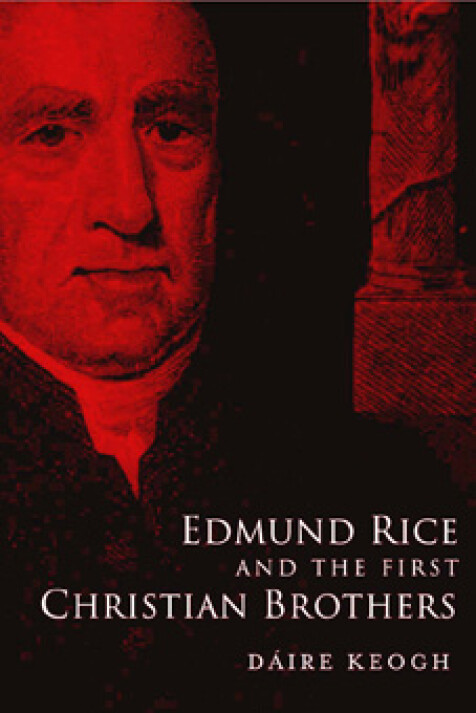Edmund Rice and the first Christian Brothers
Dáire Keogh
'[A]n interesting and informative study of Rice within the context of his own times ... Keogh is good at teasing out what clues exist to this man born into a well-off Callan family ... [He] is good at detailing the sometimes fraught dealings between Rice and local bishops. While not ignoring Rice’s spiritual quest, he is also adept at putting this within the context of the broader Catholic emancipation movement, making the point that Waterford was already the third most literate city in Ireland and that Rice saw his role as not merely to provide schooling where none previously existed but to provide an alternative Catholic education ... Keogh’s success is to place Rice within his own time, and not have him swamped by the ramifications over the next two centuries of what he had started’, Dermot Bolger, Sunday Business Post.
‘In June 2008, the Irish Christian Brothers transferred control of 96 schools to the Edmund Rice Trust, formally ending more than 200 years of Christian Brothers' education in Ireland. Daire Keogh's book is a timely reminder of the origins and early years ... Rice emerges as a determined, perhaps dogmatic man, a visionary, but someone who divided people’, Mary Daly, The Irish Times.
'Anyone who wants to understand Irish history should read at least one book about Edmund Rice and his order of 'male nuns'. Dáire Keogh has written it', Brian Lynch, Irish Independent (September 2008).
‘Here a senior and respected historian examines their [The Christian Brother’s] founder and beginnings as they were seen by contemporaries, and as they themselves saw and fulfilled their aims … It is both biography and history. The illustrations are very well placed and reproduced in the text pages’, Books Ireland (September 2008).
‘This work is a most welcome addition to the history of 19th century Irish Catholicism and Irish education in particular. The Irish Christian Brothers’ contribution to education and the church in Ireland has been immense and their story deserves to be told … This is a fine, scholarly, well-researched work, and one that is easy on the reader. In addition it is accompanied by some fine illustrations’, Paul Connell, The Furrow (March 2009).
‘Until recently, accounts of Rice by members of his order have been hagiographical, though valuable work was done in collecting the surviving evidence, the accounts of those who knew him, and the later folklore. Dáire Keogh is respectful of that tradition and makes good use of it, while subjecting it to scholarly analysis. He also contextualizes the evidence, using the advances made by historians (including himself) in understanding the transformation of Irish Catholicism and of Irish society generally during the first half of the nineteenth century. The result is a fine work of accessible scholarship, which transforms our understanding of Rice, and of the men who joined him in a remarkable experiment in educational and religious endeavour … in this fine book’, Tom Dunne, Times Literary Supplement (July 2009).
‘This historical reputation of the Irish Christian Brothers has risen and fallen with that of the Church to which they contributed so much. Once hailed as architects of the independent Catholic nation, they are now more likely to be associated with brutal corporal punishment, t he perpetuation of a destructive militaristic nationalism and a succession of sordid sexual scandals. Dáire Keogh’s fine study is thus a welcome restoration of historical perspective … the account of his religious conversion, strongly influenced by classics of continental spirituality, provides valuable insights into the largely hidden world of middle-class Catholic devotion in the same era', SJ Connolly, Ecclesiastical History (July 2009).
‘This splendid scholarly work will go down well with others like me who have benefitted from the sacrifice and dedication of the Irish Christian Brothers and the wonderful education they provided for us', Réamonn Ó Muirí, Seancas Ard Maca (2009).
'Dáire Keogh has published a well researched and critical account of the early Brothers and their founder, Edmund Rice (1762–1844). Keogh’s Edmund Rice and the First Christian Brothers threads its way between the extremes of irrational attach on church institutions on one hand and blind defence on the other: it succeeds in tabling evidence of how the founding group saw themselves and how they were seen by their contemporaries … [the book] will be of great value to all those interested in the history of Ireland and Australia, and beyond that to those studying religion and society, education history, the history of the Catholic Church, and modernisation debates', Val Noone.
‘The brothers helped to shape a growing and influential Catholic lay leadership who, in turn, greatly strengthened the brothers’ role in Irish national life. Keogh has given us a clearer understanding of how this all happened as well as an explanation of why the public’s view of both the Christian Brothers and the Catholic Church in Ireland have so radically changed over the past thirty years', Vincent J. McNally, Catholic Historical Review (July 2010).

